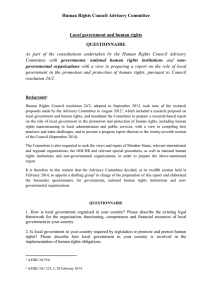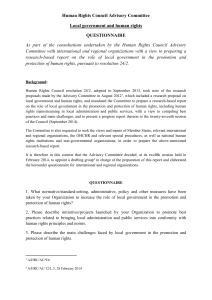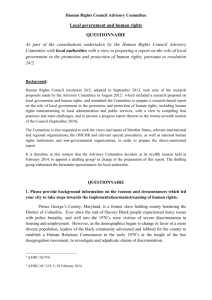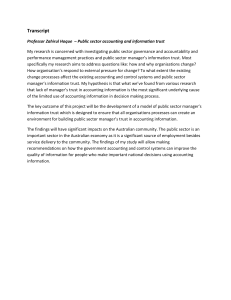Human Rights Council Advisory Committee Local government and human rights QUESTIONNAIRE
advertisement
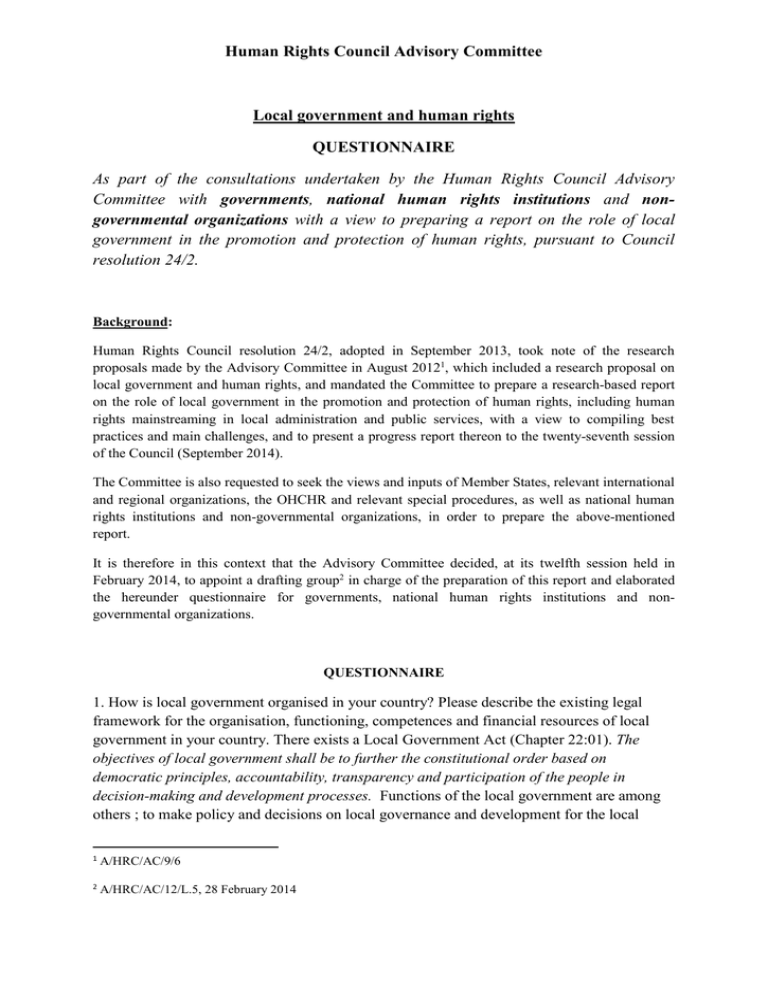
Human Rights Council Advisory Committee Local government and human rights QUESTIONNAIRE As part of the consultations undertaken by the Human Rights Council Advisory Committee with governments, national human rights institutions and nongovernmental organizations with a view to preparing a report on the role of local government in the promotion and protection of human rights, pursuant to Council resolution 24/2. Background: Human Rights Council resolution 24/2, adopted in September 2013, took note of the research proposals made by the Advisory Committee in August 20121, which included a research proposal on local government and human rights, and mandated the Committee to prepare a research-based report on the role of local government in the promotion and protection of human rights, including human rights mainstreaming in local administration and public services, with a view to compiling best practices and main challenges, and to present a progress report thereon to the twenty-seventh session of the Council (September 2014). The Committee is also requested to seek the views and inputs of Member States, relevant international and regional organizations, the OHCHR and relevant special procedures, as well as national human rights institutions and non-governmental organizations, in order to prepare the above-mentioned report. It is therefore in this context that the Advisory Committee decided, at its twelfth session held in February 2014, to appoint a drafting group2 in charge of the preparation of this report and elaborated the hereunder questionnaire for governments, national human rights institutions and nongovernmental organizations. QUESTIONNAIRE 1. How is local government organised in your country? Please describe the existing legal framework for the organisation, functioning, competences and financial resources of local government in your country. There exists a Local Government Act (Chapter 22:01). The objectives of local government shall be to further the constitutional order based on democratic principles, accountability, transparency and participation of the people in decision-making and development processes. Functions of the local government are among others ; to make policy and decisions on local governance and development for the local 1 A/HRC/AC/9/6 2 A/HRC/AC/12/L.5, 28 February 2014 government area; to consolidate and promote local democratic institutions and democratic participation, to make by-laws for the good governance of the local government area. Financial resources are drawn from the Government consolidated fund. There are grants and funding for local development projects from external sources. 2. Is local government in your country required by legislation to promote and protect human rights? Please describe how local government in your country is involved in the implementation of human rights obligations. The Local Government Act furthers the promotion of constitunal orders based on the principles of transparency, accountability and participation. All these are in tandem with fulfilment of human rights standards. 3. Is there any cooperation between local government and the central government in your country regarding the implementation of human rights at local level? If yes, please describe the existing cooperation framework. The Malawi Growth & Development Strategy II is the overarching developmental policy in the country. While human rights are listed as one of the priority areas, they are not core to the functions of government. As a result, the level of conceptualisation and programming on most government projects is not human rights based; this leaves a gap in terms of mainstreaming human rights standards in service delivery at local level. Therefore, remains a challenge to measure the impact on existing efforts. 4. Do you have human rights protection mechanisms at the local level in your country (e.g. ombudspersons, human rights commissions, mediators, etc.)? There exists a national human rights institution (Section 129&130) and Office of the Ombudsman (Section 129-128). Although, since their establishments both institutions have made efforts to roll out regionally, there is a lack of representation at the local level, specifically at the District Executive Council (the Council makes decisions on developmental programmes at district level and also comprises membership from civil society organisations) 5. What initiatives have been taken to include human rights mainstreaming in local administration and public services? In collaboration with Malawi Human Rights Resource Centre, there have been efforts to mainstream the Malawi Public Service Charter, at the district level. The charter among other things emphasises on public awareness and holding government accountable, on human rights standards in tandem with service delivery in areas such as health, agriculture, social welfare. The Commission has been involved in training the technical committees at district level on complaints handling, as a means of promoting accountability on the local government in various areas of service delivery. 6. What is the role of civil society in the planning and implementation of activities for the protection and promotion of human rights at local level in your country? 2 Civil society organisations work in their own capacities, as well as form part of the District Executive Council (DEC) at the local level in all districts in Malawi. They have a fair representation at DEC; they play a role in program formulation, planning and monitoring. They also work with Community Based Organisations on human rights awareness, as well initiate developmental programs in order to improve the human rights situation 7. What is the role and programme of your organization for promotion and protection of human rights at local level or in enhancing local governance for human rights? The Commission has over the years built strong networks with Community Based Organisations which are their main contact points at district level in human rights awareness programs. To further local governance for human rights, the commission has embarked on a Training of Trainers programmes, since CBO’s have a wider reach within their communities and can ably mobilise communities to demand services from local government. The Commission also holds public inquiries into specific issues such as maternal health within the communities, this process is inclusive and communities have a sense of ownership in holding local governments accountable in issues of access to health services and others. The Commission also works closely with the District Social Welfare Office in monitoring child care centres (orphanages, transit centres) as well as the District Child Protection Committees. Previously, Commission had MOU’s with organisations that have establishments at all district levels, this allowed for joint programmes in influencing decisions at the local level and furthering efforts to mainstream human rights in their functions. 8. What are the main challenges faced by local government in your country in the promotion and protection of human rights? Mainstreaming of human rights at conceptual and program level remains a challenge. Policy makers and implementers lack appreciation of a human rights based approach to service delivery. 9. Please provide any best practices with regard to the above-mentioned issues. Human Rights Based Approach to program formulation and implementation at Central and Local governments, will go a long way in improving service delivery and the human rights situation in the country. Application of principles of good governance will increase financial prudence and accountability. Deadline for submission of responses to the questionnaire: In order to give the Drafting Group the opportunity to take into account the different contributions, all parties are encouraged to submit their responses as soon as possible and at the latest by 11 April 2014. Answers can be submitted via email to the following address: hrcadvisorycommittee@ohchr.org 3 OR Secretariat of the Human Rights Council Advisory Committee c/o Ms. Meena Ramkaun Office of the United Nations High Commissioner for Human Rights Palais Wilson, Room 4-060, Fax: +41 22 917 9011 United Nations Office at Geneva, CH-1211 Geneva 10, Switzerland Thank you for your contribution. For more information on the Advisory’s mandate: http://www.ohchr.org/EN/HRBodies/HRC/AdvisoryCommittee/Pages/HRCACIndex.aspx 4
